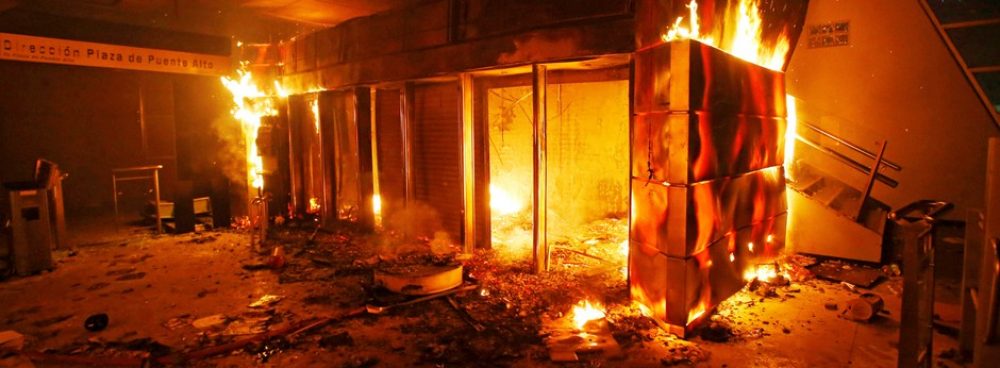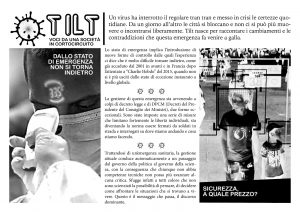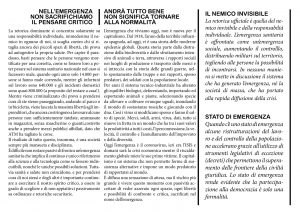Risulta chiaro che la diffusione del Coronavirus è più di una semplice minaccia per la salute. Senza ignorare l’importanza della Salute pubblica, che è attualmente messa a dura prova da parte di un virus incontrollato, riteniamo che il nucleo della gestione pandemica non sia tanto di ripristinare la sicurezza sanitaria, quanto di affrontare le sue conseguenze devastanti sull’economia. Lo scoppio della pandemia non si è verificato in un tempo storico neutrale, ma durante cambiamenti epocali, avviati, almeno nell’ultimo decennio, dallo scoppio della crisi capitalista globale. È un dato di fatto, quindi, che la gestione della crisi sanitaria sia incorporata nella più ampia gestione della crisi del sistema e dei deadlock che si sono creati.
Passando per il periodo di “pace”, senza precedenti, che ci lasciamo alle spalle, in cui stava avvenendo un fenomeno di rallentamento o addirittura fissazione della produzione, la pandemia accelera rapidamente il tempo storico e intensifica le tendenze destabilizzanti già esistenti nell’economia globale (recessione, mancanza di investimenti, concorrenza commercial-energetica) con qualcosa di ancora più drastico.
L’economia mondiale è il malato. E la pandemia, come fenomeno ciclico, incarna le sue contraddizioni dell’epoca in cui si manifesta. Infatti, il cortocircuito provocato dalla diffusione del virus Covid-19, accelera la necessità di un’altra ristrutturazione capitalistica, questa volta in ambito bellicoso. In un periodo di stagnazione economica globale, di accumulo del capitale (ancora una volta) in ambito finanziario e della creazione di una “bolla” ancora più pericolosa di quella portò alla crisi del 2008.
Questa mancanza di sbocco e l’imminente deflagrazione dell’economia globale, si riflettono nello sforzo incessante degli Stati di mantenere o rafforzare la loro posizione nella quota di mercato rimasta. Si riflettono nella militarizzazione dell’economia, sia in termini di politiche commercial-energetiche aggressive (embargo, sabotaggio, sanzioni e tariffe), che in termini di impiego militare diretto o indiretto in aree di interesse energetico e geo-strategico. In un ambiente così
freneticamente competitivo e marginale, la pandemia e le sue conseguenze sull’economia possono solo accelerare lo scoppio di un nuovo, ancora più profondo, fallimento del sistema.
Il fallimento sistemico che sta avvenendo in maniera celata, al momento si manifesta come un processo di “distruzione del capitale”, con il carattere asimmetrico e acceleratorio apportato dalla pandemia. In altre parole, la pandemia è semplicemente il detonatore della bomba a orologeria di un’economia globale che sta per esplodere da tempo. Pertanto, l’arresto della produzione, la riduzione o l’annientamento dei profitti e l’accumulo di debiti per un certo numero settori strategici (turismo, energia, commercio), creeranno un radicale riarrangiamento del mercato con chiusure aziendali e licenziamenti di massa. Chiaramente, questa “distruzione del capitale”eliminerà principalmente le parti più deboli di esso che non saranno in grado di far fronte al sovraindebitamento e, di conseguenza, rafforzerà i grandi monopoli che assorbiranno le perdite principalmente attraverso il prestito dalle banche centrali degli Stati. Ma questo processo di ripristino dei monopoli avverrà in un ambiente ancora più volatile a livello internazionale. La contrazione del PIL di alcuni stati, (Deutsche Bank stima al 24% per l’UE… un dato che non appariva dalla Prima Guerra Mondiale), il crollo del prezzo del petrolio e del gas, l’aumento insostenibile del debito pubblico e privato di alcuni stati capitalisti (ad esempio l’Italia) e il crollo del mercato azionario, sono e saranno temi centrali per delineare confini e alleanze competitivo-belligeranti in cui il mondo del commercio, dell’energia, e delle relazioni diplomatiche che gli stati dovranno affrontare all’indomani della pandemia.
All’interno di questo contesto, l’attuazione di un’”economia di guerra” come prospettato da K. Mitsotakis, descrive bene la situazione attuale. Il mancato e prolungato funzionamento “a pieno regime” del mercato e i suoi effetti a catena su un certo numero di settori dell’economia, agiscono come un acceleratore per il possibile scoppio di un fallimento immediato e incontrollato (anche in Grecia). Il comunicato di guerra emesso da Mitsotakis non riguarda la “minaccia asimmetrica” della pandemia, ma la contrazione sempre crescente dell’economia e la preparazione militare dello Stato per la gestione dello Stato di emergenza. La terminologia scelta dal capo del governo greco per comunicare con la società e le misure adottate per rafforzare e sostenere il capitale e i datori di lavoro paralizzati dal calo di redditività, sono tipiche di condizioni di guerra e fallimento.
Tali interventi statali “marziali” si sono già stati messi in campo nel 2010 con il fallimento ufficiale dello Stato greco. Le misure straordinarie decise dall’UE e dalla BCE con un programma di acquisto di obbligazioni di 750 miliardi di euro (di cui 12 miliardi per la Grecia), a parte il fatto che non sono state destinate a rafforzare l’economia reale come “iniezione di liquidità”, ma ad assorbire le obbligazioni tossiche detenute dai fondi, rientrano nel debito pubblico dei bilanci degli Stati. E se oggi operazioni simili vengono presentate come misure di natura “protezionistica”, domani si riveleranno ancora più disastrose di quelle del 2010, perché si accumuleranno a spese di un’economia spezzata, sovra-indebitata e devastata da più di un decennio. I prestiti “solidali” e le iniezioni di liquidità nel bilancio dello Stato dall’UE sono capitali che dovrebbero essere teoricamente coperti e rimborsati da una società che, di fatto, è già fallita e chiusa. Quindi “economia di guerra” significa un nuovo ciclo di memorandum, licenziamenti, riduzioni salariali e pensioni, spese sociali e privatizzazioni. Quello che lo Stato sta dando oggi per fermare la sua bancarotta, domani lo pagheremo col sangue.
Attualmente, lo Stato, attraverso lo sforzo coordinato di rallentare e controllare la diffusione della pandemia, sta correndo al ripristino della normalità produttiva e al riavvio immediato dell’economia. L’imposizione di severe misure sanitarie, come condizione di base per demarcare e trattare il virus non è attuata in funzione della protezione della salute pubblica come apparentemente affermano, bensì della drastica riduzione temporale della destabilizzazione economica. Qui dovremo soffermarci un po’ più a lungo. Anche se consideriamo che la questione della congiuntura non sia quella di garantire la salute ma di salvare l’economia, ciò non significa che riteniamo, ingenuamente, il rischio pandemico come inesistente. La critica e l’opposizione in un determinato contesto devono sempre essere portate avanti con consapevolezza e Responsabilità Sociale, ricordando che la minaccia per la salute pubblica e la sua attualmente necessaria protezione sono dati di fatto. In quanto soggetti socio-politici, abbiamo la responsabilità di adottare misure di
protezione della salute senza identificarci con gli imperativi dello Stato. Perché lo Stato, come meccanismo criminale-antisociale, impone ordini sanitari-repressivi spostando il peso della diffusione del virus sulla società, sbarazzandosi della
responsabilità politica dell’ormai insufficiente sistema sanitario pubblico. Perché lo Stato e i suoi meccanismi di propaganda, promuovono abilmente la “responsabilità individuale” e le riunioni sociali come le principali cause della diffusione del virus, senza menzionare il sotto-finanziamento, la chiusura degli ospedali, la mancanza di attrezzature, medicinali e unità di terapia intensive. Al contrario stiamo adottando misure non per evitare le nostre responsabilità, ma per sollevarle e portarle sulle nostre spalle, assieme a tutti i ricatti e le estorsioni a cui siamo sottoposti. A chi continua a lavorare nelle condizioni più avverse (lavoro, salute ed economiche) servono coesione sociale e solidarietà e se servono medicine adeguate, cibo e ospedali. A chi è in cassa-integrazione, disoccupato o lavora “a nero”, a chi è prigioniero nelle carceri e nei campi di detenzione per migranti. Stiamo adottando misure per evitare che come popolazione eccedentaria e improduttiva in tempo di guerra, soffriremo e moriremo impotenti.
Stanno parlando e stiamo parlando di guerra. Ed è vero. Perché ciò che sta accadendo intorno a noi oggi è l’unico modo per descriverlo. Dal quadro generale ci troviamo di fronte all’incombenza di una Terza Guerra Mondiale, tra le trincee della vita di tutti i giorni contiamo le migliaia di morti pandemiche da registrare come “vittime di guerra”. Dall’innalzamento dei prezzi al mercato nero. Dagli scaffali dei supermercati vuoti, allo stoccaggio di cibo. Dal “reclutamento” di alcuni dipendenti per ridurre le perdite del datore di lavoro, al licenziamento di altri. Dalla coercizione del lavoro senza prevenzione sanitaria elementare, agli straordinari di emergenza. Dall’insufficienza ospedaliera e di attrezzature mediche e l’inadeguatezza del personale infermieristico, alla trasformazione degli ospedali in reparti zeppi di “feriti di guerra”. Dal divieto di raduni, alla fobia di comunicare e toccarsi a vicenda.
Tutto questo è parte di un trattato di guerra. E ancora di più, la distopia che stiamo vivendo può sembrare poca cosa di fronte a ciò che si prospetterà se lo stato di emergenza sarà esteso e la pandemia si diffonderà in misura incontrollabile. Se il bilancio delle vittime aumenterà e la disoccupazione, la fame, i debiti e l’incapacità di soddisfare i bisogni di base renderanno insostenibile la vita di tutti i giorni. In altre parole se entreremo in uno stato di dissoluzione generalizzata del tessuto sociale con focolai di esacerbazione di violenza antisociale e domestica, depressione, nevrosi e suicidi. Ecco perché oggi, il movimento attuando il progetto senza tempo di solidarietà di classe, è chiamato ad agire come forza trainante per salvaguardare la società. Ma la difesa della nostra classe, la difesa della solidarietà come elemento vitale per la sopravvivenza spirituale e fisica della società, non può essere delineata riempiendo i vuoti lasciati dallo Stato e auto-organizzando la nostra povertà, ma nel rivendicando i bisogni sociali fondamentali come veicolo per la totale trasformazione rivoluzionaria della società. Lo slogan “rivoluzione o barbarie” è ciò che cattura il dilemma dei nostri tempi. Perché l’intensità cosmogonica e l’estensione delle contraddizioni che il capitalismo produce oggi, guideranno l’umanità, sia alla sua liberazione che alla sua regressione.
Quindi dovremmo perseverare. Il periodo in cui ci troviamo è cruciale. L’attacco dello Stato sia a livello economico, riversando le enormi perdite subite verso gli strati sociali più bassi; sia a livello politico con l’istituzione della “quarantena” contro la società e le sue resistenze, ha nuovamente ed enfaticamente posto le questioni di organizzazione e contrattacco del movimento come decisive per il suo futuro. Si giudicherà, ancora una volta nella storia recente, se il movimento è in grado di comprendere l’entità storica delle questioni aperte dalla situazione, se (e come) è in grado di comprendere la sua posizione e il suo ruolo, se riuscirà a svolgere il suo dovere storico: prima come cumulo di resistenza contro l’aggressione capitalista-repressiva e poi come forza critica per il rovesciamento rivoluzionario.
La cristallizzazione delle controversie politiche sulla situazione e i successivi obiettivi fondamentali da fissare, come concreta condensazione dell’aggressione capitalista contro di noi, possono creare le condizioni per la fiducia in sé stessi, una “fiducia di classe”, per l’unione e il contrattacco. La difesa della salute pubblica e il suo rafforzamento con personale permanente aggiuntivo, la fornitura gratuita di beni di prima necessità (medicinali, cibo), il requisito della prevenzione sanitaria dei lavoratori che sono costretti ad essere esposti alla pandemia, lo stop dei pagamenti (affitti, bollette, ecc.) di tutti i disoccupati e dei lavoratori che sono in vacanza forzata, l’arresto dei licenziamenti e l’obbligo di decongestionare le carceri; sono alcuni dei punti che condensano la gestione di classe della pandemia e le lotte che devono essere portate avanti contro di essa.
Ma non ci facciamo illusioni. Le lotte necessarie in questo periodo non sono facili da iniziare in una condizione così soffocante. La crisi ci trova ancora una volta impreparati. E peggio ancora, ci trova in un regime che vieta l’incontro pubblico e la presenza per le strade. L’astensione dal pubblico dominio e la risposta collettiva di massa a ciò che sta accadendo intorno a noi, danno spazio e tempo preziosi al nemico. Il tempo e il territorio che stiamo perdendo sono insostituibili e forse aspettare la fine della pandemia per colmare le lacune che già si stanno formando sarà troppo tardi. La rapidità degli sviluppi e la mancanza di elaborazione collettiva di posizioni e azioni di intervento sociale, possono portare ad una paralisi cinematica generalizzata con ramificazioni catastrofiche. Anche ora, e al fine di proteggere la salute pubblica, dobbiamo considerare la necessità di un’azione in pubblico in situazioni di emergenza. Il nemico si è già organizzato per questo. Dovremmo fare lo stesso. Questa preoccupazione del nemico, attraverso la militarizzazione della vita sociale imposta con il pretesto della pandemia, riguarda i metodi preventivi di contro-insurrezione e la fortificazione dello Stato nei confronti di una possibile esplosione sociale generalizzata, concausa e conseguenza di un fallimento imminente. La quarantena sociale è arrivata per restare, ed è già imposta con il controllo panottico nelle città, attraverso l’integrazione degli ordini istituzionale con metodi distopici di autocontrollo della società sopita e chiusa in casa, ma anche attraverso il dispiegamento di unità militari per le strade delle metropoli. Se in un ambiente così sterile di esasperazione sociale, il mancato rispetto degli ordini sanitari porta a multe e arresti, allora la resistenza in qualsiasi forma dovrebbe essere considerata, di fatto, criminalizzata e sanzionata. Qualcosa sta cambiando e lo sentiamo tutti. Viviamo sull’orlo della storia, nella fase di transizione di un cambiamento radicale del mondo nella forma in cui lo abbiamo conosciuto fino ad oggi. E i sintomi di questo periodo intermedio, sotto forma di antagonismi, pandemie, crisi, fallimenti e militarismo, prefigurano un futuro ancora più inquietante e minaccioso per l’umanità. Qualcosa sta cambiando e lo vediamo tutti.
La scelta, ora, spetta a noi. Non ci sono forze metafisiche che muovono la storia, e la diffusione di una pandemia destabilizzerà ma in nessun modo distruggerà il capitalismo. La discontinuità storica della liberazione di classe sociale e la distruzione del capitalismo, risiedono solo nell’atto umano. Nel violento cambiamento rivoluzionario della società. Gli Stati, fintanto che le loro società e le loro resistenze resteranno dismesse e non organizzate, assorbiranno le vibrazioni delle loro crisi (sanitarie, economiche, di guerra) e creeranno le condizioni per un attacco ancora maggiore. In altre parole, senza resistenza, la sovranità sarà stabilizzata, riorganizzata e rafforzata. E in particolare oggi, l’uscita senza ostacoli del capitalismo dalla sua crisi sanitario-economica, lascerà dietro di sè le condizioni per un cimitero sociale. Silenzio, paura e miseria. La scelta, quindi, sorge nuovamente con enfasi: O NOI O LORO.
Ταξική Αντεπίθεση (ομάδα Αναρχικών και Κομμουνιστών)
Contrattacco di classe: Pandemia come sintomo dello Stato di emergenza del sistema


